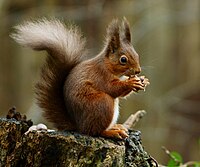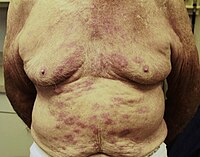
Conservation of genetic uniqueness in remaining populations of red squirrels (Sciurus vulgaris L.) in the South of England
Sign Up to like & getrecommendations! Published in 2019 at "Ecology and Evolution"
DOI: 10.1002/ece3.5233
Abstract: Abstract The Eurasian red squirrel (Sciurus vulgaris) is an emblematic species for conservation, and its decline in the British Isles exemplifies the impact that alien introductions can have on native ecosystems. Indeed, red squirrels in… read more here.
Keywords: red squirrel; conservation genetic; conservation; red squirrels ... See more keywords

Molecular detection of tick-borne pathogens Borrelia afzelii, Borrelia miyamotoi and Anaplasma phagocytophilum in Eurasian red squirrels (Sciurus vulgaris)
Sign Up to like & getrecommendations! Published in 2017 at "European Journal of Wildlife Research"
DOI: 10.1007/s10344-017-1104-7
Abstract: Eurasian red squirrels (Sciurus vulgaris) are common hosts of ixodid ticks and could thus carry tick-borne disease agents. The relative contribution of the red squirrel, a medium-sized rodent species, to the transmission dynamics of tick-borne… read more here.
Keywords: red squirrels; borrelia; eurasian red; borne pathogens ... See more keywords

North American red squirrels mitigate costs of territory defence through social plasticity
Sign Up to like & getrecommendations! Published in 2019 at "Animal Behaviour"
DOI: 10.1016/j.anbehav.2019.02.014
Abstract: For territorial species, the ability to be behaviourally plastic in response to changes in their social environment may be beneficial by allowing individuals to mitigate conflict with conspecifics and reduce the costs of territoriality. Here… read more here.
Keywords: costs territory; red squirrels; defence; north american ... See more keywords

High δ 13C values in red squirrels Sciurus vulgaris explained by a reliance on conifer seeds
Sign Up to like & getrecommendations! Published in 2023 at "Isotopes in Environmental and Health Studies"
DOI: 10.1080/10256016.2023.2179045
Abstract: ABSTRACT Eurasian red squirrels Sciurus vulgaris have unusually high δ 13C values compared to other forest rodents, which is seemingly related to the consumption of 13C-enriched conifer seeds. To test this hypothesis, we analyzed the… read more here.
Keywords: conifer seeds; sciurus vulgaris; squirrels sciurus; red squirrels ... See more keywords

Eurasian Red Squirrels Show Little Seasonal Variation in Metabolism in Food-Enriched Habitat
Sign Up to like & getrecommendations! Published in 2017 at "Physiological and Biochemical Zoology"
DOI: 10.1086/694847
Abstract: Energy expenditure and ambient temperature (Ta) are intrinsically linked through changes in an animal’s metabolic rate. While the nature of this relationship is stable, the breadth of change in thermoregulatory cost varies with body size… read more here.
Keywords: red squirrels; eurasian red; metabolic rate; squirrels show ... See more keywords

A reclassification of red squirrels, Tamiasciurus hudsonicus (Rodentia: Sciuridae), on Isle Royale
Sign Up to like & getrecommendations! Published in 2019 at "Biological Journal of the Linnean Society"
DOI: 10.1093/biolinnean/blz038
Abstract: Isle Royale (western Lake Superior, USA) is a geographically isolated archipelago with the potential to sustain endemic populations. The island has served as an ecological model for predator–prey interactions between wolves and moose, but little… read more here.
Keywords: tamiasciurus hudsonicus; reclassification red; isle royale; squirrels tamiasciurus ... See more keywords

Phenotype–environment mismatch errors enhance lifetime fitness in wild red squirrels
Sign Up to like & getrecommendations! Published in 2023 at "Science"
DOI: 10.1126/science.abn0665
Abstract: Mismatches between an organism’s phenotype and its environment can result in short-term fitness costs. Here, we show that some phenotype–environment mismatch errors can be explained by asymmetrical costs of different types of errors in wild… read more here.
Keywords: environment; environment mismatch; phenotype environment; red squirrels ... See more keywords

Further evidence of leprosy in Isle of Wight red squirrels
Sign Up to like & getrecommendations! Published in 2017 at "Veterinary Record"
DOI: 10.1136/vr.j1920
Abstract: Leprosy due to Mycobacterium lepromatosis infection was first diagnosed in red squirrels (Sciurus vulgaris) on the Isle of Wight in 2015. Acid-fast bacilli typical of Mycobacterium species were observed histologically in two animals that had… read more here.
Keywords: leprosy isle; lepromatosis; red squirrels; squirrel ... See more keywords

Detecting viral infection in red squirrels
Sign Up to like & getrecommendations! Published in 2019 at "Veterinary Record"
DOI: 10.1136/vr.l1798
Abstract: Adenovirus (ADV) infection is geographically widespread in both wild red squirrel ( Sciurus vulgaris ) populations and captive collections.1 ADV is often asymptomatic but can become pathogenic. It has been associated with significant mortality in… read more here.
Keywords: detecting viral; red squirrels; infection; viral infection ... See more keywords

British Red Squirrels Remain the Only Known Wild Rodent Host for Leprosy Bacilli
Sign Up to like & getrecommendations! Published in 2019 at "Frontiers in Veterinary Science"
DOI: 10.3389/fvets.2019.00008
Abstract: Eurasian red squirrels (Sciurus vulgaris) in the British Isles are the most recently discovered animal reservoir for the leprosy bacteria Mycobacterium leprae and Mycobacterium lepromatosis. Initial data suggest that prevalence of leprosy infection is variable… read more here.
Keywords: remain known; squirrels remain; red squirrels; squirrel ... See more keywords